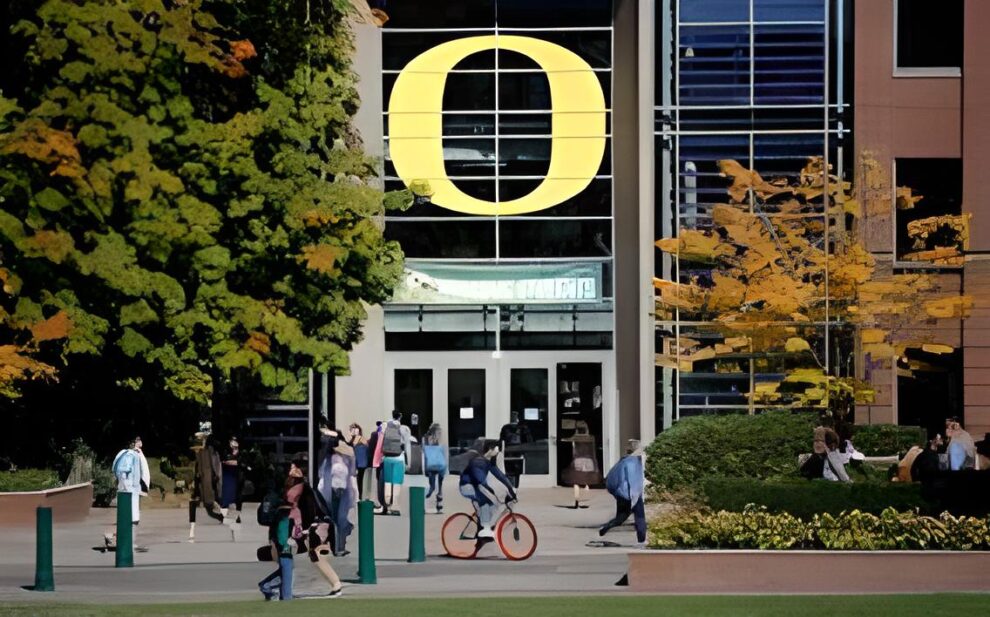Thirty-two female athletes filed a lawsuit against the University of Oregon on Friday that alleges the school is violating Title IX.
The plaintiffs, who are all either on the varsity beach volleyball team or the club rowing team, are accusing the school of “depriving women of equal treatment and benefits, equal athletic aid, and equal opportunities to participate in varsity intercollegiate athletics”.
The lawsuit filed in US district court in Eugene, Oregon, seeks correction of the alleged violations and unspecified damages.
The lead counsel for the women is Arthur H Bryant of Bailey Glasser, who is known for legal efforts to enforce Title IX, the federal law that prohibits gender inequality by educational institutions receiving federal funds.
The beach volleyball players say they do not have facilities for practicing or competing. Instead, the team must practice and compete at a public park with inadequate facilities.
“For example, the public park lacks any stands for spectators, has bathrooms with no doors on the stalls, and is frequently littered with feces, drug paraphernalia, and other discarded items,” the players allege in the lawsuit. “No men’s team faces anything remotely similar.”
Oregon released a statement that said an on-campus facility for beach volleyball is currently in the development stage. It also said Oregon is “committed to providing a quality, positive experience for all our student-athletes”.
Many of Oregon’s men’s teams, including the fifth-ranked Ducks football team, have state-of-the-art facilities, take chartered flights to games, eat catered food and have other amenities. The Ducks were playing on Friday night in the Pac-12 championship game against Washington in Las Vegas.
Of the 20 varsity sports at Oregon, only beach volleyball does not provide scholarships, although NCAA rules allow the school to give the equivalent of six full athletic scholarships to the team. Players say they wear hand-me-down uniforms and are not provided with any name, image and likeness (NIL) support.
“Based on the way the beach volleyball team has been treated, female athletes at Oregon do not need much food or water, good or clean clothes or uniforms, scholarships, medical treatment or mental health services, their own facilities, a locker room, proper transportation, or other basic necessities. Male athletes are treated incredibly better in almost every respect,” team captain and lead plaintiff Ashley Schroeder said in a statement.
Schroeder said the team could not practice this week because someone had died at the park.
In its statement, Oregon said it provides “all student-athletes, including our female athletes, with academic support, tutoring, student-athlete development, medical care, mental health support, meals and snacks, and nutrition and sports training”. The school also said it has previously committed to increasing scholarships.
“The university believes it complies with Title IX. [The University of Oregon] has not yet been served a copy of the complaint, and therefore we are unable to comment on any further specifics,” the university’s statement said. Beach volleyball has been recognized by the NCAA since 2010 and Oregon’s program was founded in 2014. The first Division I championship was held in 2016.
The rowers say the university fails to provide equal opportunities for athletic participation by not having a varsity women’s rowing team.
The lawsuit, which sprang from an investigation published in July by the Oregonian newspaper, cites Equity in Athletics Disclosure Act statistics that show that 49% of the student-athletes at Oregon are women, but only 25% of athletics dollars and 15% of recruiting dollars are spent on them.
The NCAA’s president, Charlie Baker, has previously addressed possible inequities in NIL deals, saying he was concerned about potential Title IX implications because NIL opportunities seem to be disproportionately going to male athletes.
The NCAA lifted its ban on college athletes being able to earn money for sponsorship deals and endorsements in 2020.
Source: The Guardian










